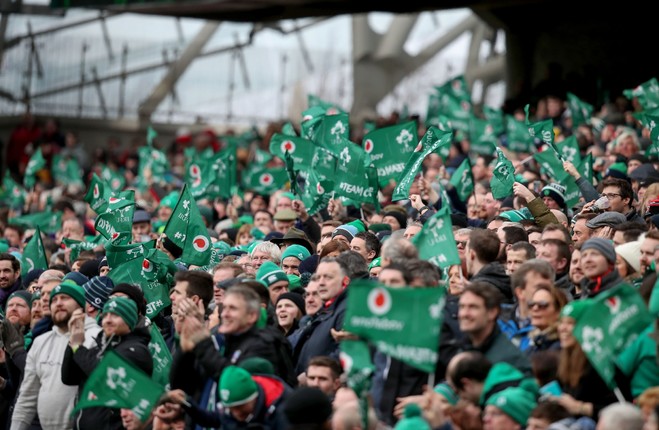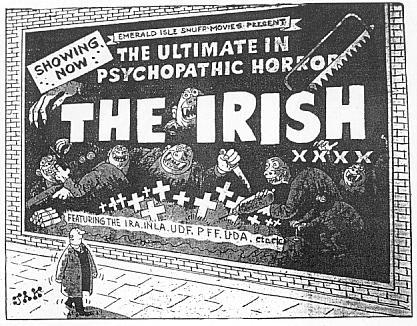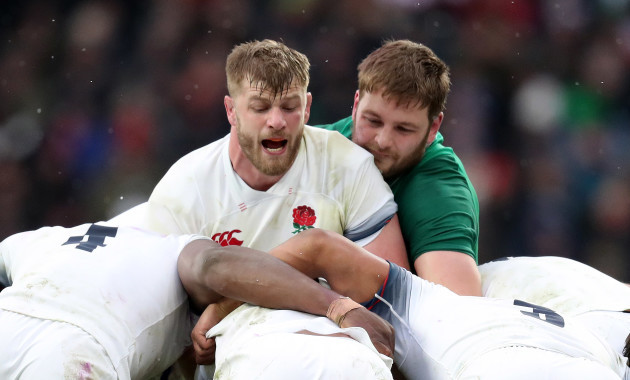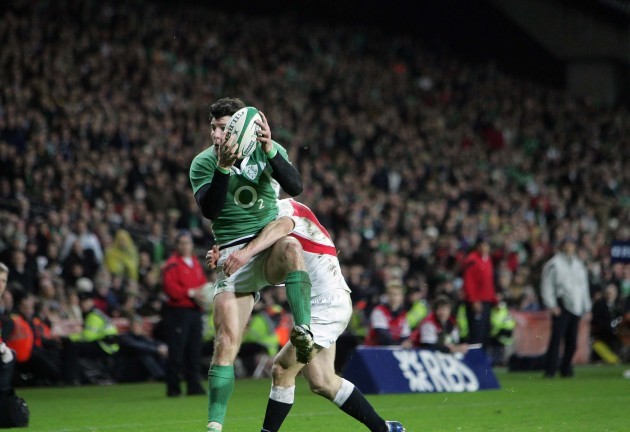CONTEMPT SPAT OUT of the news pages. It was quite the skill, a cartoonist managing to be resentful, racist and offensive all at the same time. You can see his work for yourself (below) and make your own mind up.
Now imagine what it was like to be an Irish person living in England back then, travelling home on the tube, gazing at the cover of the London Evening Standard, knowing how others look at you.
You can’t make allowances for the timing. The ‘70s and ‘80s may have been dark decades in Anglo/Irish relations, the IRA’s bombing campaign bringing death and terror to England’s streets, but was it too much of a stretch to ask an editorial team to make a distinction between a gunman and a citizen?
It evidently was. The irony that two descendants of Irish emigrants had risen to the highest offices in British politics – James Callaghan becoming Prime Minister, Denis Healey appointed Chancellor of the Exchequer – had clearly been lost.
There was fear and loathing in London back then. In the same year that Gerry McLoughlin was inspiring Ireland to victory in Twickenham, Raymond Jackson (JAK) was sharpening his pencil and producing his filth. You can see it here, a mocked up cinema poster, titled The Irish – the ultimate in psychopathic horror.
“I remember it at the time,” Roy Foster, Ireland’s leading historian, says now. “It was ethnically if not racially prejudiced.”
And it was how a certain section of English people viewed us. Nearly four decades on, we’re back at another crossroads politically and back once again in Twickenham.
You’d like to think sport is removed from all this but can it be? All week, in the Ireland camp, the underlying theme has been about identity – Andy Farrell, an Englishman of Irish heritage – inviting two titans, one from the music industry; the other a sporting icon, to speak to his squad about Irishness.
If you were wondering why Farrell chose to call on Bono and Paul O’Connell to verbalise their private feelings then look again at that cartoon. Unless we speak up, this is how others will speak of us. “That was truly an age of ignorance,” Foster, a Waterford-man who became Professor of Irish history at Oxford University, says. “Those grizzly anti-Irish sentiments were regular features in the Evening Standard in the 1970s. It was a low time.”
Times change and sport reflects that. Sometimes – like in 1973 when the English rugby team bravely stepped onto the field at Lansdowne Road, a year after the Welsh and Scots had refused to do so, its importance goes beyond than mere symbolism.
And this matters once again now. We’re in the era of Brexit. The good vibes from the Good Friday Agreement are gradually being sucked away.
“On a personal level I still view this game, Ireland in England, through an emigrant’s eyes,” says Shane Horgan, a veteran of 65 Irish caps. “I’ve been living here (in London) eight years now and all week I’ve sensed how important it is to the ex-pat community in terms of their Irishness and connection to home.
“For us, this is one we have to win. Maybe we hang onto colonial bitterness. To English people, Ireland – even though it was the nearest colony geographically – just isn’t anywhere near as important a fixture in the sporting calendar for them as it is for us.”
Horgan’s hunch is accurate. Sitting in the coffee dock of the Westbury Hotel a month ago, George Kruis was politely amused by the stumbling awkwardness of your correspondent’s attempts to divert a conversation away from rugby to the thorny subject of why everyone wants to do a number on his England.
“It’s alright, you can ask why does everyone hate them,” Dominic Day, a former Welsh international, Saracens team mate, and now a business colleague of Kruis’, jokes.
Yet Kruis is still a little perplexed. He loves Dublin, does business here and will soon be coming back for a family wedding. Peter O’Mahony is a close friend, a bond forged during the 2017 Lions tour. “I just don’t do hate,” the England second row says. “Ireland, it’s a rivalry, sure. They’re such a good team. But Australia, New Zealand, France, Scotland, Wales – they’re all rivals. Ireland/England is just another big game.”
Well, it’s not just another game on this side of the Irish Sea. “This is the one everyone stops you in the street to talk about,” says Tommy Bowe. “Beat them, won’t you Tommy!’ That’s what they always said to you. ‘You’ve got to beat them.”
Living in London, Horgan is fascinated by the complexity of this Anglo/Irish relationship, using boxing parlance to compare tomorrow’s contest to the contender trying to grab the belt away from the champ.
“The English friends I have over here view the game through a different prism than we do,” he says. “They’re blissfully unaware how important it is to us. In terms of expectation levels, they always feel they are going to land the knock-out punch.”
Matthew O’Toole noticed the contradictions, too. Now an MLA in Stormont, the Belfast man rose to the highest chain of the British civil service, working out of Downing Street for much of the last decade. Like Foster, he saw progress in Anglo-Irish relations during Labour’s years in government and then, post Brexit, witnessed it all move into reverse.
“The average English person thinks about Ireland a lot less than your typical Irish person thinks about England,” O’Toole says. “Even in the political classes, you get plenty of leading figures who don’t give Ireland much thought, which is why so many politicians have said clumsy, sometimes offensive and insensitive things to both unionists and nationalists, over the years.
“That attitude extends to sport. Like many people I watch the Six Nations, but my impression – from living and working for 20 years in England – is that the English/Scotland, England/Australia rivalry carried slightly more reverence to English fans than the England/Ireland one.”
In a sense it’s easy to understand. As a one-time colonial power, England has had a bloody history with all the major rugby nations. Bar England, Ireland hasn’t. It’s why travelling to France can’t carry the same relevance because their capital never housed colonies of Irish immigrants, the way London, and also Manchester, Liverpool and Birmingham did.
Foster has written about this, his book Paddy and Mr Punch, exploring the sectarian and racist prejudices held towards the Irish in 19th century Britain, charting the progress an underclass of refugees made into England’s middle classes.
There have been dark times,” Foster says. “Even when I first came to England, in 1974 – well over a century after the first wave of immigrants landed here, there was still a strong anti-Irish sentiment among working class English communities.
“Things improved markedly in the ‘90s, helped considerably by a team of supremely talented diplomats in the Irish embassy who made a deliberate attempt to win over the Tories in particular. We saw serious improvements in terms of an understanding and respect of Irish culture, culminating eventually in the Good Friday Agreement.”
Nine years later came a seismic sporting moment, Croke Park opening its doors to rugby, God Save the Queen being played on the same ground where, nearly a century earlier, British troops had callously murdered Irish citizens. “As an Irishman, as an emigrant, as a historian, as a sports fan, that moment in Croke Park brought tears to the eyes,” Foster said, “because of the nobility of the response to the anthem; it felt like history being updated.”
Horgan wasn’t just an eyewitness to history but a participant, his 63rd minute try the enduring image of a momentous day.
“For me, it felt significant in a couple of ways,” Horgan says, “firstly from the element that it allowed Irish people to express how they felt about their relationship with England.
“Think about that, how else could this happen? There hadn’t been a referendum on the Anglo/Irish issue since 1998. Here, you had 83,000 people inside a stadium. They could express how they felt towards England through their voices at a game.
“I’ve read and heard people say the (2007) game changed things but I’m not so sure that is the case. For me, the attitude of people that day was more a reflection of how Ireland, as a country, had already changed.
There was a second element to that day for me. Rugby in our country was always wrapped up as a Garrison Game. Social class was inevitably mentioned too, given how the sport is played in so many private schools. I always had the impression that we – as rugby players – weren’t considered as Irish as GAA sportspeople and that felt kind of weird because so many of us were from GAA backgrounds.
“Plus, rugby’s an all-Ireland sport. I’d like to think – although I’m not 100 per cent sure I’m right about this – but I’d hope that rugby being played in Croke Park altered those views somewhat.”
Brian Kerr certainly thinks it did – making that very point on this site a few weeks ago.
Foster is from a similar generation to Kerr, the latter being a professor in soccer, the former in Irish history.
The tragedy of Brexit,” Foster says, “is the kind of people who have come out of the woodwork from the extreme right of the Conservative Party, Michael Gove, Boris Johnson. They have appealed to ignorant, bone-head, anti-Irish, little Englanders. And it’s just so sad and so annoying because I’ve lived in this country for 46 years and have seen the progress that was made.
“These people just have no idea the damage that is being done to Anglo/Irish relations and also to north/south relations. I’m appalled by the backward steps. The Tony Blair Labourites understood Northern Ireland. They could figure out the complexities. This lot can’t. This new secretary of state (Brandon Lewis) is your typical Essex-man, a thicko. Do you know why rugby is great? It’s because it has always risen above this.”
Shane Horgan is a pundit for Virgin Media. All the Six Nations games are live on Virgin Media.




